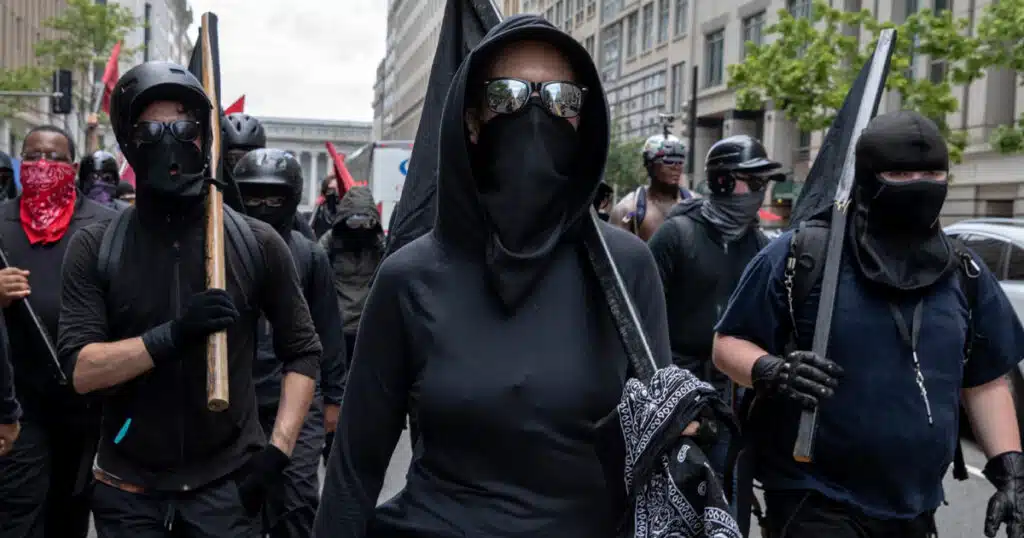
Time to Designate Antifa as a Domestic Terrorist Organization: Protecting America from Within
In the shadow of escalating domestic unrest, the United States faces a insidious threat not from foreign adversaries but from within its own borders. On September 12, 2025, the arrest of an alleged assassin targeting conservative leader Charlie Kirk—a suspect who openly espoused far-left Antifa ideology—underscored the deadly potential of so called anti-fascist leftist extremism. This incident, coming amid a surge in doxxing and assaults on law enforcement, is no aberration. Antifa, the decentralized network of self-proclaimed leftist radicals, has evolved from fringe protesters into a force orchestrating violence that meets every criterion of domestic terrorism. It’s time for the U.S. government to formally designate Antifa as a domestic terrorist organization. Such a move would unlock vital tools for disruption, deter future attacks, and reaffirm the rule of law in an era of polarization. Congress and the President must act now—before more lives are lost and communities torn apart.
The legal foundation for this designation is clear and compelling. Under 18 U.S.C. § 2331(5), domestic terrorism encompasses acts dangerous to human life that violate federal or state laws, intended to intimidate civilians, coerce government policy, or disrupt governmental conduct within U.S. jurisdiction. Antifa’s playbook—arson, assaults, targeted intimidation and now assassination —fits this mold precisely. Unlike foreign terrorist organizations (FTOs), which the State Department designates under 8 U.S.C. § 1189, domestic groups lack a centralized federal list. However, the Department of Justice (DOJ) and FBI already treat Antifa-linked violence as terrorism in investigations. In May 2020, then-Attorney General William Barr publicly labeled Antifa’s rioting as domestic terrorism, a stance echoed in the 2025 Homeland Threat Assessment by the Department of Homeland Security (DHS), which prioritizes anarchist networks like Antifa as drivers of violent extremism.
Designating Antifa wouldn’t require reinventing the wheel; it would build on existing precedents. The FBI’s Domestic Terrorism program already pursues Antifa-inspired actors, as seen in ongoing probes into 2020’s George Floyd riots, where over 2,000 arrests stemmed from Antifa-coordinated chaos causing $2 billion in damages. More recently, H.Res. 26, introduced on January 9, 2025, by Rep. Marjorie Taylor Greene (R-GA), explicitly deems Antifa’s conduct—motivated by “anarchist and revolutionary socialist ideology”—as domestic terrorism and calls for its formal designation. Though non-binding and still pending in the House Committee on the Judiciary as of September 15, 2025, this resolution reflects bipartisan unease with unchecked extremism. President Trump’s administration has signaled intent to prioritize such threats, with former advisor Steve Bannon declaring on September 14 that “Trump is a wartime president now focused on eradicating domestic terrorists like ANTIFA.” By enacting legislation or issuing an executive order under the International Emergency Economic Powers Act (IEEPA), the government could impose sanctions, freeze assets, and enhance surveillance—tools proven effective against groups like ISIS affiliates.
Antifa’s history of violence demands this urgency. Emerging in the U.S. in the 1980s Antifa has since morphed into a hydra-headed movement employing “black bloc” tactics: masked militants hurling Molotov cocktails, vandalizing property, and assaulting perceived enemies. The 2020 nationwide riots were a watershed, with Antifa cells in Portland, Seattle, and Minneapolis turning protests into sieges on federal buildings. Over 100 consecutive nights of unrest in Portland alone overwhelmed law enforcement, resulting in billions in economic fallout and dozens injured. Fast-forward to 2025, and the pattern persists with lethal intensity. In June, a self-identified Antifa extremist carried out a targeted attack in New Jersey, exploiting political divisions to justify violence, as reported by the New Jersey Office of Homeland Security and Preparedness. July brought fresh horrors in Portland, where Antifa-affiliated anarchists doxxed Immigration and Customs Enforcement (ICE) officers, exposing their personal information online and inciting threats. DHS data reveals an 830% spike in assaults on ICE personnel since early 2025, directly linked to these campaigns of intimidation.
These aren’t spontaneous outbursts; they’re ideologically driven operations. Antifa’s doctrine seeks to silence dissent through force, doxxing journalists and politicians who challenge their narrative. The Charlie Kirk assassination attempt exemplifies this: The suspect’s manifesto invoked Antifa symbolism, including references to Italian anti-fascist resistance songs, framing the radical attack as leftist righteous warfare against “fascists” like Kirk. In January 2025, amid post-election tensions, USA Today reported fears of Antifa reprisals, with activists not ruling out violence against a perceived “fascist” Trump administration. The Center for Strategic and International Studies (CSIS) estimates that far-left extremists, including Antifa, accounted for 25% of U.S. terrorist plots from 2019–2020, a trend continuing into 2025 with online radicalization fueling lone-wolf actors. This violence isn’t just destructive; it’s coercive, pressuring governments to alter policies—from defunding police to curbing free speech—through fear.
The national security rationale is equally stark. In a polarized America, Antifa exploits divisions to undermine institutions. The DHS’s 2025 assessment warns of rising domestic violent extremism (DVE), with anarchist groups like Antifa blending into broader protests to evade detection. Their decentralization—autonomous cells communicating via encrypted apps—mirrors ISIS tactics, making them resilient yet vulnerable to targeted designations that could sever funding streams from sympathetic donors or crowdfunding. It is not unreasonable to consider that antifa is already coordinating with foreign terrorist organizations against the United States. Without formal status, law enforcement remains hamstrung: Reactive arrests after attacks, like the Portland doxxings, fail to prevent escalation. A designation would enable proactive measures, including RICO charges for organized patterns of crime and financial tracking under Treasury Department oversight.
Moreover, equity demands action. The government questionably prioritized right-wing extremism post-January 6, 2021, with the FBI labeling white supremacists as the top DVE threat. Yet Antifa’s toll is comparable: From the 2017 Charlottesville clashes, where Antifa clashed violently with alt-right groups, to 2025’s targeted killings, their actions sow chaos. Ignoring one side erodes trust in justice. Bipartisan support exists; even some Democrats have condemned Antifa violence, as seen in 2020 statements from figures like Sen. Kamala Harris distancing the movement from legitimate protest.
Critics warn of overreach: Antifa isn’t a formal organization, they argue, and designation could chill free speech or ensnare peaceful activists. The RAND Corporation highlighted in 2020 that lacking a domestic terrorist list complicates matters, potentially leading to First Amendment challenges. But this is a red herring. The Guardian’s March 2025 piece fretted over potential FBI misuse under figures like Kash Patel, but safeguards like judicial review and congressional oversight mitigate abuse. Antifa’s own rhetoric glorifies violence—“punch a Nazi,” as chanted in rallies—crosses into incitement, not protected speech. Failing to act rewards impunity, emboldening extremists on all sides.
When considered in a balancing analysis, benefits outweigh risks. A designation would deter recruitment, especially among disillusioned youth radicalized online. It could foster international cooperation, as allies like the UK monitor similar groups. Economically, curbing Antifa’s disruptions— from riot damages to business flight—saves billions. Most importantly, it restores public confidence: When CBS News reported in 2025 on Antifa-linked threats against lawmakers, it highlighted a chilling effect on democracy.
To the 119th Congress and President: Pass H.Res. 26 into binding law. Direct the DOJ to compile an evidence-based domestic terrorist registry, starting with Antifa. Allocate resources for FBI task forces to dismantle cells, as DHS urges amid the 830% assault surge. States should coordinate federally. This isn’t about partisanship; it’s about safeguarding the republic from those who weaponize ideology against it.
America stands at a crossroads. The Charlie Kirk attempt, Portland doxxings, and Portland sieges are harbingers. Designate Antifa as domestic terrorists today, and reclaim peace tomorrow. The cost of inaction is too high—more violence, more division, more eroded trust. Act now, for the sake of our union.



